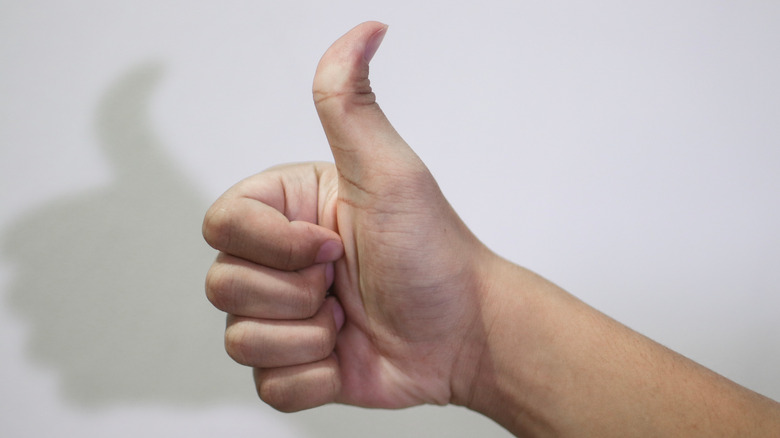The Real Reason Not Everyone Has A Hitchhiker's Thumb
Curling your tongue, rolling your R's, and bending back your thumb are popular party tricks only a select few of us seem to be able to do. Why is this? While the human body is naturally designed for motion, how is it that some people appear more flexible than others — like, for example, having hitchhiker's thumb?
Those with hitchhiker's thumb, otherwise known as distal hyperextensibility, are able to overextend the thumb's average reach, sometimes bending it back at a full 90-degree angle (via WebMD). This hyperflexibility of the thumb may occur in only one hand, or may be present in both (via Healthline). Though it may appear painful, the hypermobility of hitchhiker's thumb generally doesn't cause pain. However, for those who possess this trait, using everyday objects designed for the thumb's standard range of motion may prove somewhat awkward or uncomfortable. As writer Amy Gillie describes in a blog post for You Me Mind Body, her hitchhiker's thumb made playing the piano and cutting with scissors a bit problematic.
So just how rare is it to possess hitchhiker's thumb, and why doesn't everyone have one?
Genetics determine whether or not you have hitchhiker's thumb
Scientific research on hitchhiker's thumb is relatively limited, but a 2011 study examined the presence of hitchhiker's thumb in over 300 participants in South Nigeria and determined that 15.5% of males and nearly 17% of female participants possessed the trait (per Healthline). An earlier study, conducted in the U.S. in 1953, found that hitchhiker's thumb was present in nearly one-fourth of white participants and roughly 36% of Black participants (via Healthline).
It turns out that hitchhiker's thumb is genetically inherited. Since the gene responsible for a straight thumb is considered dominant, hitchhiker's thumb is a recessive trait, according to WebMD. This means that unless both parents possess the recessive gene, or allele, for hitchhiker's thumb, the child will end up with two straight thumbs.
Still, there is some debate about the science behind hitchhiker's thumb. The argument exists that the natural position and bendiness of the thumbs vary greatly from person to person, and can't be classified simply as either hitchhiker's thumb or not (per WebMD).


